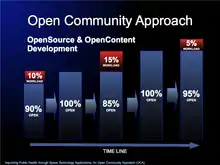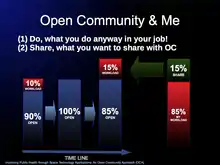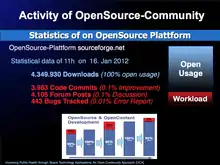

Open Community Approach is a generalization of the concept of OpenSource and OpenContent to other collaborative effort. The term “open” for an open community refers to the opportunity for anyone to join and contribute to the collaborative effort. The direction and goals are determined collaboratively by all members of the community. The resulting work (“product”) is made available under a free license, so that other communities can adapt and build on them.


An OpenCommunity prefers to use open scientific, educational and technological resources to accomplish the goals of the community:
- OpenSource-Software (see e.g. List of OpenSource Software of EFG-SGH)
- Open Educational Resources: OpenContent (e.g. Creative Commons License and Open Educational Resources OER )
- Open Proposal Management: Especially helpful for humanitarian activities,
- Open Projects, e.g. Reference to helpful existing Projects
- Open Access and Publishing: Green Open Access and publishing concept that charges neither authors nor readers.
- Open Certification Management: (e.g. Mozialla Open Badges & Badge Alliance) and Digital Signature for e.g. signing a classical physical certificate with Public-Key-Infrastructure.
- Open Source Hardware (e.g. OpenSource electric vehicle[2] or building research equipment with free, open-source hardware[3]) the community
- can build a version of the product or spare parts to optimize the product/hardware (waste reduction) and
- share the plan of the optimized product again with community, if the user improved the hardware.
- (Open Scientific Paper Development) Develop a scientific paper within a Wiki environment.
An Open Community Approach assigns the objectives to the United Nations Sustainable Development Goals (see e.g. the Community of Practice in the Expert Focus Group for Space and Global Health
Remark
An Open Community Approach never charges money for a service, a product or educational material. Implementation are driven by donation, donations of labor force to accomplish Open Community Goals.
Workflow
- Analyse existing
- if they are helpful for accomplishment of e.g. technical, scientific or educational goals.
- identify missing gaps and quantified the additional development workload.
- integrate the implementation of
- additional features in an OpenSource infrastructure, accessible to the community (e.g. GitHub, ...),
- add additional learning resources to an open respository of learning material (e.g. Wikiversity),
- provide scientific results to an (Green) Open Access Journal and provide Open Quality Assurance with your expertise to discussion pages.
- share proposals of projects to the community (Open Proposal Management)
Learning Task
- (Fallback) Learn about fallback method in risk management and explain how an open source, open content and open data approach allows an sustainable use of resources even if the human and financial resources are not available in a project or initiative. Other projects and initiatives can pick up the stopped development or branch into new development strains.
- (Theoretical Background of OCA) Explore the concept of Swarm Intelligence and explain why a divers group are able to solve problems that no one of the group could solve alone. Collaborative effort create more workload, than pushing your own agenda forward without community intelligence. What are your implications for Swarm Intelligence and OCA.
- (Open Proposal Management) Analyse the concept of Swarm Intelligence (SI) and explain
- why it is so difficult for scientist to share proposal for scientific grants to the scientific community, even the science is build on the workflow that analyses the state of the art and builds new results on it.
- Explore the Wikiversity Project Everyone's favorite news site. Explain the benefits and challenges of the project.
- (From Wiki Reader to Wiki Author) Describe the PROs and CONs of an Open Infrastructure (see From Wiki Reader to Wiki Author).
- (OpenWHO) Analyse the interactive, web-based platform tp enable the Organization and its key partners to transfer life-saving knowledge to large numbers of frontline responders. Explain why the access is open to access to the course are free for everyone after registration and describe why the content cannot be changed by the users!
- (Open Universe Initiative) Explore the concepts of the Open Universe Initiative and identify the application of open data for astrophysics. What are requirements and constraints for capacity building from a content and domain perpective.
- (Grand challenges) Analyse grand challenges identify how the Open Community Approach is able to address the needs.
- (Risk Management) Identify possible workflows for integration of the Open Community Approach into Risk Management and Risk Literacy!
History
In this context of Public Health and Space Technology the Expert Focus Group for Space and Global Health (EFG-SGH - formerly AT6FUI[4]) the “product” of the open community is an “improved public health by application of space technologies”. The definition of the term "Open Community Approach" is derived from the OpenSource definition.[5]
See also
- Open Source Software
- Open Innovation Ecosystem
- Scientific Hackathon
- Open Source Migration
- "Everyone's favorite news site" is a research project at Wikiversity.
External Resources
- "Open Seventeen" Open Community Approach for Sustainable Development Goals
- "OpenSource Guide" - principle, communities and legal aspects.
- "OpenWHO" - OpenWHO is interactive, web-based, knowledge-transfer platform offering online courses for capacity building in the context of life-saving knowledge to large numbers of frontline responders.
References
- ↑ UN-Guidelines for Use of SDG logo and the 17 SDG icons (2016/10)- https://www.un.org/sustainabledevelopment/news/communications-material/
- ↑ Lim, H., Park, J., Lee, D., & Kim, H. J. (2012). Build your own quadrotor: Open-source projects on unmanned aerial vehicles. IEEE Robotics & Automation Magazine, 19(3), 33-45.
- ↑ Pearce, J. M. (2012). Building research equipment with free, open-source hardware. Science, 337(6100), 1303-1304.
- ↑ Expert Focus Group for Space and Global Health - see official United Nations Documents http://www.unoosa.org/oosa/ourwork/psa/globalhealth/
- ↑ Wikipedia OpenSource Model - derived definition - see https://en.wikipedia.org/wiki/Open-source_model